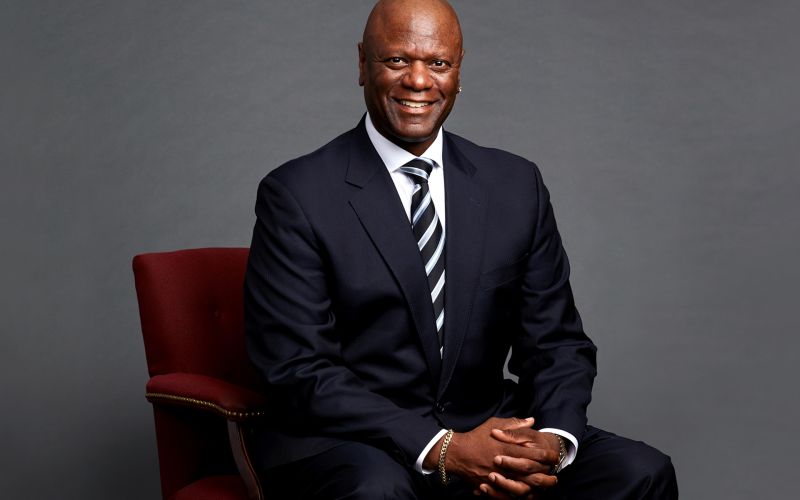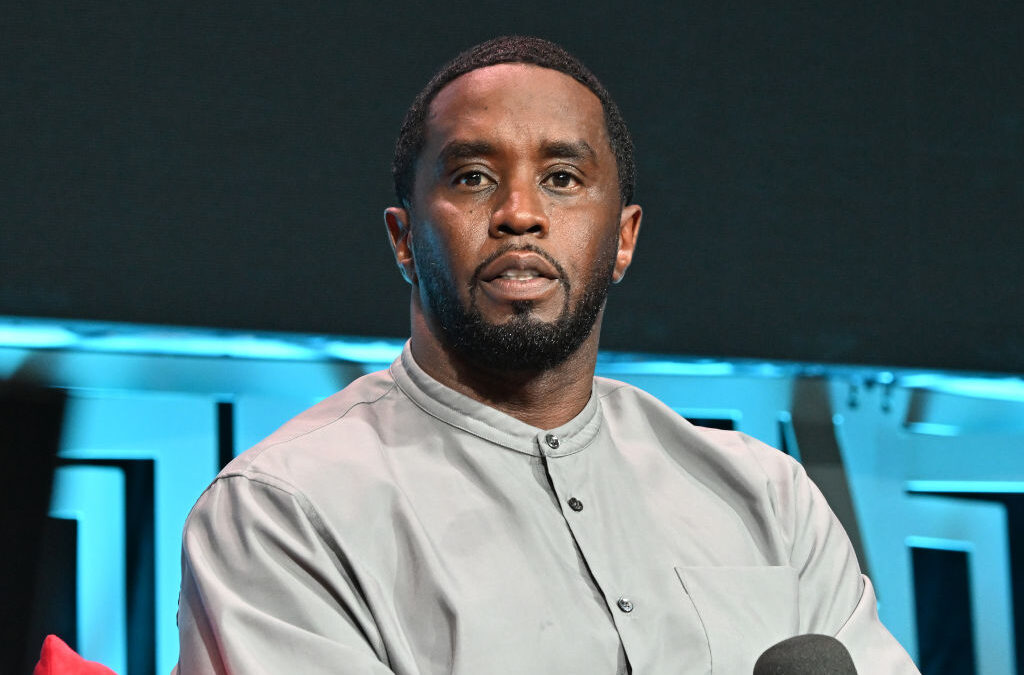‘This is a very complex rags to riches story’: Former Bad Boy Records producer weighs in on Diddy’s trial
Prince Charles Alexander, a former producer at Diddy’s House, describes a decade working for the music titan.
Words by Nikki Peach

Ever since Sean ‘Diddy’ Combs was arrested on charges of sex trafficking, racketeering and transportation to engage in prostitution, the reaction from those once associated with him can largely be divided into three camps: shock, silence or satisfaction. Prince Charles Alexander, a music producer who worked at Combs’ record label, Bad Boy Records, for almost a decade falls into the first camp.
From the beginning, Alexander knew he was working for someone formidable – determined if not destined to reach heights never before seen in the New York City music scene. He joined the creative arm of Bad Boy Records, Diddy’s House, from its inception in 1993 and worked there until the early noughties. During this period, he witnessed great changes in Combs, from his ambition to his lifestyle, but claims not to have known what was allegedly going on behind closed doors.
Combs (also known as Diddy, Puffy and Love) was arrested in September following a federal sex trafficking investigation and his high-profile trial began earlier this month. He has pleaded not guilty to all charges and has also denied a slew of civil allegations accusing him of sexual assault, abuse and drugging over 20-year period.
‘I was witness to enough radical change over a decade to know that, if there was something going on, it was probably related to some of the changes that I saw,’ Alexander, who currently works as a music professor at Berklee College of Music, tells me over Zoom. That change came in many forms. Money: by 1997, the label had its first $100 million (£75m) year. Power: Combs was known for creating a hierarchy around him that never saw him dip from top position. Ambition: He expanded his influence from music production to launch Combs Global (formerly Combs Enterprises), a diverse portfolio of business and investments including music, fashion, fragrance, beverage, marketing, film, TV and media properties.
‘In the beginning, most of us thought that music was all Puffy was about. As he developed, we realised, or at least I realised, that this was only one of the things in his head and he had bigger aspirations,’ posits Alexander. ‘Music was a stepping stone for an African American to move through established hierarchy to get to another position and it was brilliant – brilliantly executed, brilliantly thought of, brilliantly played out.’
‘The creatives involved might not have even known they were part of it,’ he continued. ‘If you’re an artist, you think “Puffy just signed me, Bad Boy just signed me, my world is going to become huge”, meanwhile you are one of the artists making Puffy become a bigger brand. I think it was primarily in the head of Puffy because he knew that everyone’s success was going to feed his success.’
Those artists included The Notorious B.I.G., Faith Evans, French Montana, Machine Gun Kelly, Janelle Monae and Cassie, who was in an on-off relationship with Combs from 2007 to 2018. In late 2023, Cassie, whose real name is Cassandra Ventura, filed a lawsuit against Combs alleging that he subjected her to a pattern of control and abuse over a decade, which he vehemently denied. Then in May 2024 CCTV footage from 2016 was leaked online, which showed Combs violently kicking and beating Ventura outside their hotel room. He issued an apology on social media the following day and the case was settled outside of court, reportedly for an eight-figure sum. Ventura is due to testify in court during his trial.
While Bad Boy Records was, until recently, an undoubtable star machine, Alexander believes the real beneficiary was Combs himself. This was a man hellbent on achieving astronomical success and seemingly did whatever it took to do so. ‘One day, Puffy came into the studio and said, “I’m going to become an artist” and I already knew him as a wunderkind behind the scenes as a marketing person, promotion kind of business type, so when he came in and said “I’m going to be an artist” I was like okay, that’ll never happen, it’s just a whim. From the moment he said it to me, it took about two years, and it actually came to fruition,’ Alexander recalls. ‘And he was a good artist.’
However, Combs’ route to becoming a global artist is revealing – at least in terms of his cunning. ‘He had great writers perform on the mic and then he went in and learned the parts and replaced their part with his,’ the former Bad Boy producer explains. ‘He’s like a painter who had all these paintings with his name on and sold them for a lot of money, but he never painted them. Puffy was that kind of entrepreneur.’ Isn’t that deceit? ‘I did not perceive it as deceit,’ Alexander responds. ‘I perceived it as a very clear understanding of how business worked, how the creative process worked, the end product service, the listener, the audience.’
‘I was witness to enough radical change over a decade’ – Prince Charles Alexander

He’s right. By 2022, Combs was worth an estimated $1 billion (£757m), however according to Forbes his net worth has reportedly dropped to $400 million (£528). In running such a tight ship, however, Combs was quick to discard those who no longer served the brand. ‘It took a while, I’d say within five or six years, for the first crew of people that started to leave or get fired. When they first entered, the people he was listening to had high value for him,’ Alexander explains. ‘The more successful he got, those people were no longer around him, and then 10 years later the remnants of the people that knew him when he was just entering were almost altogether gone.’ He had a knack for ensuring the ones who remained ‘were catering to his every whim’, as Alexander put it, ‘it must be intoxicating’.
Alexander was not fired, but he decided to step back from the business after witnessing a flurry of confrontations and a ‘lack of graciousness’ on Combs’ part. ‘He was having confrontations with so many people. Puffy wanted to win – even in a conversation. He didn’t know how to mix records when I was first with him. As a producer, I’m teaching him. And then when the student wants to turn their back on the teacher it can be received if it’s gracious, but when he wasn’t gracious with that one, it’s only a matter of time before he’s not gracious with me, even though I’ve been around for a decade.’
At this point, I referenced some of the video footage circulating in the many documentaries about Combs’ life, career and trial that show him throwing his weight around in the studio and shouting ‘I get what I want’. ‘Everything you saw is basically what I saw,’ the professor adds. ‘I remember one time he came in and he took the Billboard charts, and he said, “This right here, this is my shit.”’
Alexander then recalled another interaction where he had spent the best part of six hours mixing a song in the studio. ‘Puffy comes in with a young lady, a famous young lady, and he wants to impress her, so he goes to the console and picks one of the percussion instruments and turns it all the way up and says, “Now it sounds better.” I had been working on this thing for hours and I look at him and basically say something like “get out of here”, something crazy like that.
‘I could see he was posturing for the young lady and it felt childlike, almost like a joke, but there was a moment of crossing where he was like “no, I’m serious, this is how I want it to be”. Now I’m an expert on music. I sat there for hours mixing this record and you come and turn something up out of context and you’re telling me that’s how the record should be?’.
Eventually, as an independent contractor, Alexander began to turn down work opportunities at Diddy’s House and found it elsewhere instead. ‘These small things, which are small aggressions, at a certain point you’re like if he’s going to try you at level two, he’s going to try you at level three, and if he’s going to try you at level three, he’s going to try you at level four.’
While Alexander would never have described them as friends, per se, he did expect a certain level of respect, especially as someone 12 years his senior who was there from the beginning. He has not been in touch with Combs for more than 15 years and claims to have known very little about his trial. ‘Is it possible that I was oblivious, and it was happening around me?’ he asks. ‘It’s possible because I was really focused on the creative product. If it happened in the rooms, in the studio, I probably would have been aware of it, because everybody gossips. There was gossip, but it wasn’t usually of a sexual nature, it was probably more on the violent nature like somebody had a fight or somebody pulled a gun on somebody.’
‘I never saw anything like that in my sessions,’ he maintains. ‘I was the uncle, and people were kind of on their better behaviour around me.’ Alexander is keen to point out is that what he knew of Combs behaviour was not unusual for the time. Hip-hop culture was known for its hedonism, bravado and misogyny. This was not necessarily the case in R&B or punk, as he points out, but it was happening in hip-hop, and Combs was a figurehead of the genre.
‘I’ve been around dozens of artists who have come from nothing to incredible heights. Very few of them stay the same. Many of them move into the money in ways that take on a certain amount of hedonism. Some of them never outgrow it. Some of them don’t survive it, they expire before they come to terms with it. Some of them come to terms with it and come back to Earth and do amazing things,’ he explains. ‘I did not know that Puffy had moved into such an expression of hedonism as what I’m learning.’
As to whether there is truth to the mounting allegations. ‘Who knows? This is a very complex rags to riches story. It’s for the judges and the jury and the psychologists to sort through.’
Alexander hopes that, irrespective of the verdict of Combs’ trial, the legacy of that period of music is not tarnished. ‘Can we separate the artist from the art? In this case, it’s actually easy because the artist wasn’t there hands on creating the art. I’m not say he wasn’t involved, but there were songwriters, musicians, guitar players, drummers, beat makers, turntable and audio engineers and studio managers – lots of people who contributed to an amazing run in New York City.’
Combs trial is expected to last for eight weeks.
Photo: Prince Charles Alexander via LinkedIn

